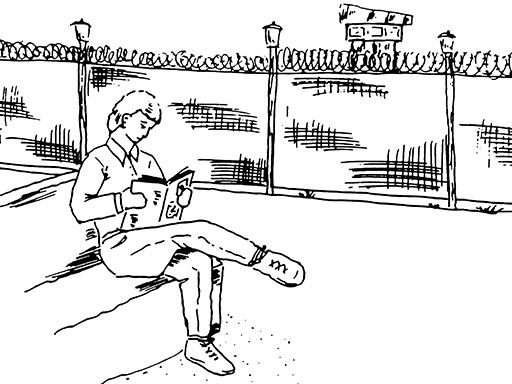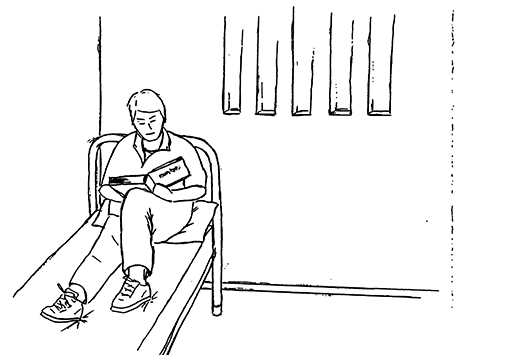2 Going into lockdown
One of the issues in the COVID-19 pandemic of 2020 is that there is no determinate end to isolation. This is very different from coping with change for a fixed period of time. Imagine for example, if you have to leave your home for 3 or 4 weeks due to emergency repairs, because of damage, a fire or a flood. You can count the days to getting back to normality. But for many of us living through this global pandemic, there is no end date in sight. So how can you cope with this kind of uncertainty?
For people like David and Michael, who faced indeterminate prison sentences as a result of the conflict, learning how to cope with uncertainty was essential. Take a moment to read their reflections on how they felt in those early days of confinement.
Reflection 1: David
My name is David. I am a Loyalist ex-prisoner. I was born in Belfast in Northern Ireland and entered prison in the late 1970s when I was aged 19. After a time on remand in Crumlin Road Gaol I served over 12 years as a special category [de facto prisoner of war status] prisoner in Long Kesh [The Maze and Long Kesh prison] where I gained an Honours Degree in Psychology with The Open University.
I remember the feeling at the beginning of an indeterminate sentence. There was no release date. The years just stretched off into the distance. No one else to talk to. No one knew. Staying here until the troubles are over. 20 years? Maybe more. A slow knot of worry starting to rise in the stomach. But there are many like me. If they can survive, so can I.
But how do you measure off time. By day, week or year? There was no point in looking to the future. A forlorn hope. Pointless. Focus on the here and now. What can I do now to get this day over and let tomorrow worry about itself? It was like slowly going out to sea. I could see the land behind me, freedom, my world, a normal life. But the boat kept going out. Further and further until I could see no land. Just the endless expanse of ocean. Featureless, with no idea of when I would see land again.
‘Settle yourself’, the old hands would say. Get busy. The more you do the quicker time goes. When will this be over? I don’t know. But some day it will be over. I will prepare for that time.
Reflection 2: Michael
My name is Michael and I am a Republican ex-prisoner from Belfast in the North of Ireland. I was sentenced to life imprisonment in 1979 and after a time on remand in Crumlin Road Gaol, I spent 16 years in the H Blocks, Long Kesh Prison. For the last 9 years of imprisonment I was an Open University student, gaining a degree and diploma in adult education. I was also heavily involved in the informal Republican education system in prison. It was in my head that should I ever be released, that I would like to teach in adult education. That is exactly what I got to do.
I was 28 years old, married and employed as a social worker and facing an indeterminate prison sentence. My wife was a teacher and we had two young sons. I did not have the language for it then but unquestionably I was traumatised by the whole experience of arrest, interrogation, charging and imprisonment. I had been thrust into a new world and, with my package of responsibilities I had to maintain what control I could under the circumstances. I could not go home – a natural want. Nor could I influence the ‘high level’ rules of the place I was in. But I could survive if I followed the ‘low level’ rules of the other prisoners, who like me were all more or less new to this situation but with a little more experience of it.
I had been a political activist for most of my adult life – marginal civil rights participant, community activist in my area when the conflict began- basically a person who could read situations quite well. I was determined to hold onto that mindset of activism as much as possible in prison. I developed my own mechanisms for coping, learned some from my fellow prisoners and in general terms lived for and in the day I was.
Next you will listen to an audio conversation between David and Michael recorded remotely in April 2020. In this conversation, they discuss their experiences of going into confinement in the past and reflect on living under the restrictions imposed by COVID-19. They describe what if felt like physically and emotionally when first held on remand in Crumlin Road Gaol, Belfast in the 1970s. They also talk about some of the more challenging aspects of those first few days as they waited to find out what their future held.
Activity 3 Facing isolation for the first time
Now listen to the audio recording with David and Michael.
Please note that the conversation was recorded online.
Audio 1 transcript (Word document) [Tip: hold Ctrl and click a link to open it in a new tab. (Hide tip)]
- Having listened to this conversation, do you notice any similarities with how you are feeling now or felt when you first went into social isolation or lockdown?
- How has your life changed since lockdown?
- What adjustments have you made, if any, to cope with your changed living situation?


